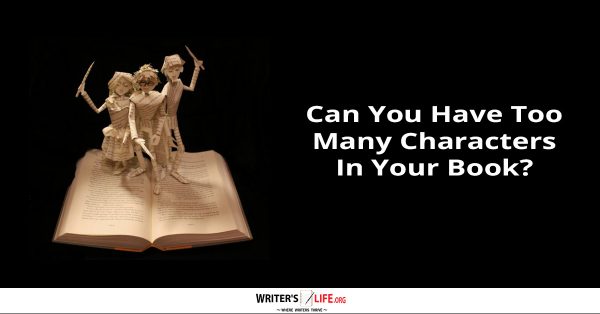- How To Tackle Jealousy In Creative Writing
- Common Submission Mistakes
- How To Stop Your Blog Becoming Boring
- The One Thing Every Successful Writer Has In Common
- How To Make Yourself Aware Of Publishing Scams
- Why Almost ALL Writers Make These Grammar Mistakes At Some Point
- 5 Tips For Authors On How To Deal With Rejection
- Top Mistakes to Avoid When Writing a Novel
- How to Avoid Common New Writer Mistakes
- 10 Mistakes New Fiction Writers Make
Can You Have Too Many Characters In Your Book?

It is natural when writing a story to include many different characters, from your protagonist whose journey readers will follow throughout, to sub characters who play a more minor, but still important role, to those who appear only for a fleeting moment such as a shopkeeper or waiter.
The question around whether a book can have too many characters is an interesting one, and the answer is complex. Really, it is all about how you present your characters in the novel as to whether the reader ends up feeling as though there is character overload or not.
The danger of introducing too many characters to your book is that readers end up losing track of them. There is nothing more irritating then enjoying a good story and then suddenly becoming confused by many different characters being together in one room, or having to flick back to remember who is who and how they are related to one another. Essentially, confusing the reader is a big no-no.
So how do you know if you have too many characters in your book, and how do you avoid character overload? Here are some useful tips:
Think about names
Characters names are important. If you use too many long, foreign, overly complicated ones it will be easy for your reader to get muddled. That’s not to say your characters can’t have strong, revealing names, but try to make sure they are all memorable and different to one another.
Make introductions count
If you want to make sure a reader remembers your character, give them a strong and unique description when you first introduce them. Unusual details about their appearance, the way they talk, act or move will help readers remember who’s who.
Are they different enough from one another?
If your characters all sound and look the same they could easily all merge into one. Make sure your characters stand out from one another to avoid a reader feeling like they are just in a world where everyone is a clone of your protagonist.
Who is speaking?
When you have lots of characters in a room it is easy for conversations to get cluttered. Try to make it clear when it comes to who is saying what to ensure the reader doesn’t become confused and lose the plot!
Are there too many stories for readers to keep up?
There is no reason why you can’t have several stories unravelling within your novel. However, if you have too many important characters in your book it will be difficult for readers to follow, and indeed, remain interested in them all.
Do characters stories link together? Do we care about them? How do they influence the main story?
Really think about how each and every one of your characters drives the story forwards. If they don’t affect your story in some way you need to think about whether they really have a role in your book in the first place. If in doubt, take them out - and see how your story reads without them.
Character overload is something we can all be guilty of and is something definitely worth paying attention to. Try to spread out introductions and think realistically about how many characters your readers can follow as well as whether they really belong in your story- if they don’t your readers probably won’t find them that memorable, to begin with!

Bethany Cadman -author of 'Doctor Vanilla's Sunflowers'


























